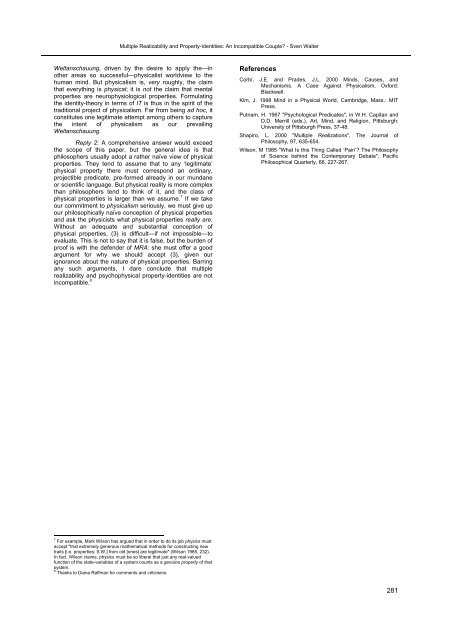Persons. An Interdisciplinary Approach - Austrian Ludwig ...
Persons. An Interdisciplinary Approach - Austrian Ludwig ...
Persons. An Interdisciplinary Approach - Austrian Ludwig ...
Create successful ePaper yourself
Turn your PDF publications into a flip-book with our unique Google optimized e-Paper software.
Multiple Realizability and Property-Identities: <strong>An</strong> Incompatible Couple? - Sven Walter<br />
Weltanschauung, driven by the desire to apply the—in<br />
other areas so successful—physicalist worldview to the<br />
human mind. But physicalism is, very roughly, the claim<br />
that everything is physical; it is not the claim that mental<br />
properties are neurophysiological properties. Formulating<br />
the identity-theory in terms of IT is thus in the spirit of the<br />
traditional project of physicalism. Far from being ad hoc, it<br />
constitutes one legitimate attempt among others to capture<br />
the intent of physicalism as our prevailing<br />
Weltanschauung.<br />
Reply 2: A comprehensive answer would exceed<br />
the scope of this paper, but the general idea is that<br />
philosophers usually adopt a rather naïve view of physical<br />
properties. They tend to assume that to any ‘legitimate’<br />
physical property there must correspond an ordinary,<br />
projectible predicate, pre-formed already in our mundane<br />
or scientific language. But physical reality is more complex<br />
than philosophers tend to think of it, and the class of<br />
physical properties is larger than we assume. 7 If we take<br />
our commitment to physicalism seriously, we must give up<br />
our philosophically naïve conception of physical properties<br />
and ask the physicists what physical properties really are.<br />
Without an adequate and substantial conception of<br />
physical properties, (3) is difficult—if not impossible—to<br />
evaluate. This is not to say that it is false, but the burden of<br />
proof is with the defender of MRA: she must offer a good<br />
argument for why we should accept (3), given our<br />
ignorance about the nature of physical properties. Barring<br />
any such arguments, I dare conclude that multiple<br />
realizability and psychophysical property-identities are not<br />
incompatible. 8<br />
7 For example, Mark Wilson has argued that in order to do its job physics must<br />
accept "that extremely generous mathematical methods for constructing new<br />
traits [i.e. properties; S.W.] from old [ones] are legitimate" (Wilson 1985, 232).<br />
In fact, Wilson claims, physics must be so liberal that just any real-valued<br />
function of the state-variables of a system counts as a genuine property of that<br />
system.<br />
8 Thanks to Diana Raffman for comments and criticisms.<br />
References<br />
Corbí, J.E. and Prades, J.L. 2000 Minds, Causes, and<br />
Mechanisms. A Case Against Physicalism, Oxford:<br />
Blackwell.<br />
Kim, J. 1998 Mind in a Physical World, Cambridge, Mass.: MIT<br />
Press.<br />
Putnam, H. 1967 "Psychological Predicates", in W.H. Capitan and<br />
D.D. Merrill (eds.), Art, Mind, and Religion, Pittsburgh:<br />
University of Pittsburgh Press, 37-48.<br />
Shapiro, L. 2000 "Multiple Realizations", The Journal of<br />
Philosophy, 97, 635-654.<br />
Wilson, M 1985 "What Is this Thing Called ‘Pain’? The Philosophy<br />
of Science behind the Contemporary Debate", Pacific<br />
Philosophical Quarterly, 66, 227-267.<br />
281












